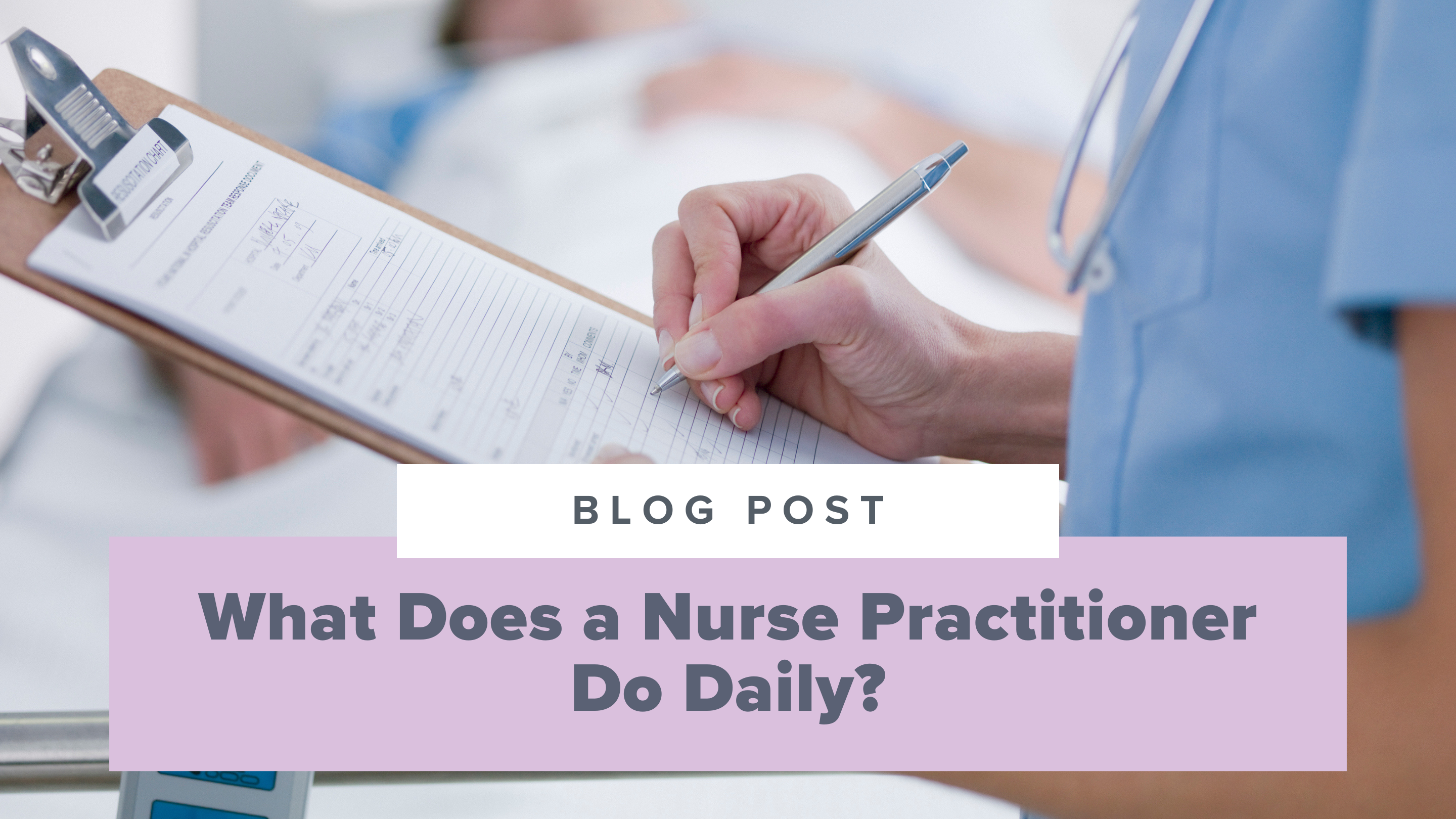What Does a Nurse Practitioner Do Daily?
- by
- May 07, 2024
- Articles

What does a nurse practitioner do daily? Short answer, a lot! They work closely with patients and families, offering diagnosis, treatment, preventive care, and promoting overall health and well-being.
In this article, we will explore nine important duties that NPs perform routinely, so you can get a real sense of what it’s like to be one of these remarkable healthcare professionals.
So, let’s dive in and discover exactly what a nurse practitioner does!
What Makes a Nurse Practitioner So Special?
NPs are advanced practice registered nurses (APRNs) who have undergone extensive training at the masters or doctoral level. This training empowers them to assume greater responsibilities in patient care and even work independently in some states, while other states still require physician supervision. Be sure to check out your state’s State Board of Nursing for full details on nurse practitioner scope of practice.
What Does a Nurse Practitioner Do Daily? Here’s 9 Things!
NPs have a wide range of important responsibilities. And it’s impossible to list all of them here. However, if you ask one of our experts “What does a nurse practitioner do daily,” they’ll tell you nurse practitioners routinely perform the following tasks.
1. Conduct Patient Assessments
As an NP, you have the vital role of assessing a patient’s medical history, performing thorough physical exams, and ordering diagnostic tests. These steps help in identifying illnesses and developing effective treatment plans.
2. Diagnose and Treat Medical Conditions
NPs can diagnose and treat a wide range of acute and chronic medical conditions. From strep throat and the flu to diabetes and heart disease, they play a crucial part in helping patients overcome various health challenges. And, depending on the NP’s specialty, they can provide care in either inpatient or outpatient settings!
3. Prescribe Medications
Part of an NP’s expertise lies in prescribing medications to treat illnesses and manage symptoms. NPs have extensive training in pharmacology and are required to complete continuing education credits in pharmacology every few years to stay up to date on the latest prescribing practices. It’s important to note that prescriptive authority may differ depending on the state.
4. Provide Preventive Care
Nurses are known for being excellent patient educators, and as an NP, you get to take that next step to make an even greater difference in the lives of patients! As an NP, you help patients stay healthy by providing preventive care, including vaccinations, health education, and cancer screenings.
5. Collaborate With Other Healthcare Professionals
NPs work closely with other NPs, physicians, nurses, medical assistants, and other healthcare professionals to provide comprehensive healthcare to patients. While NPs work autonomously and carry out a lot of their job responsibilities on their own, there is plenty of collaboration with other healthcare providers to ensure patients receive the care they need.
6. Perform Minor Procedures
Depending on their specialty, NPs may be trained to perform some minor procedures, such as suturing, skin biopsy, and joint injections. NPs that work in acute care settings can even be trained to insert central lines, chest tubes, and intubate patients.
7. Provide Emotional Support and Advocacy
NPs provide emotional support for patients and families who are affected by illnesses and help them navigate the healthcare system.
NPs also advocate for their patients by promoting healthcare policies that can benefit them, and speak out on behalf of patients who do not have a voice. See some of what NPs are advocating for here!
8. Manage Their Practice
What does a nurse practitioner do daily, that maybe is outside the purview of most healthcare professionals? Many of them own a business! Have you ever thought about what it would be like to run your own healthcare practice? Some states allow NPs to manage their own practice and work independently (i.e., without physician supervision)! Opportunities like this allow an NP to participate in an entrepreneurial business model while also helping to increase access to care for many patients.
9. Engage in Ongoing Education
In addition to the day-to-day tasks of patient care, NPs have other responsibilities as well, which include continuing education. NPs must regularly continue their education throughout their career to stay up-to-date on current practices in order to maintain their licensure. This promotes lifelong learning and professional growth.
Further Reading
What does a nurse practitioner do daily? As we just covered…a lot! NPs are incredibly important to the healthcare industry, taking on a wide range of responsibilities that contribute to patient care. The nine duties we’ve listed here are a significant part of their everyday routine. Consider these when you’re contemplating if becoming an NP is the perfect career path for you!
Looking for more (free!) articles for future NPs? Check out these other posts on the SMNP Reviews blog:
Search the Blog
Join our Facebook Group!
Get FREE support and encouragement from thousands of FNP/AGPCNP students and our NP Support team.
Learn More3 Study Hacks to Conquer Your NP Exam!
Download these tips that have helped thousands of students pass their NP board exams.
Download NowInstitutional Partnerships
Are you a faculty member and would like to bring Sarah Michelle’s resources to your school? Email us at nursinggroups@blueprintprep.com for special institutional pricing or click on the link below to learn more.
Learn MoreGroup Discounts
Are you a student and have 10 or more classmates interested in purchasing Sarah Michelle’s courses? Email us at nursinggroups@blueprintprep.com for special pricing.



